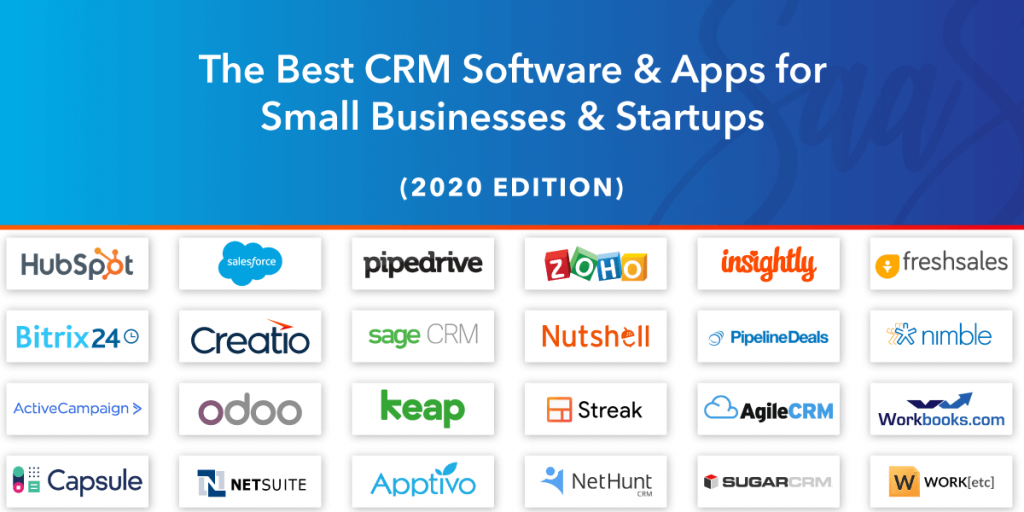Unlocking Growth: The Ultimate Guide to the Best Free CRM for Your Small Business
Starting a small business is an exhilarating journey. You’re the architect of your own destiny, building something from the ground up. But amidst the excitement, there’s the constant pressure to streamline operations, boost sales, and keep your customers happy. This is where a Customer Relationship Management (CRM) system comes into play. Think of it as your central command center, your digital brain for all things customer-related. And the best part? You don’t necessarily need to break the bank to get one. This guide explores the best free CRM options available, designed to empower your small business and help you thrive.
Why a CRM is Essential for Small Businesses
Before we dive into the specifics of each CRM, let’s understand why they’re so crucial, especially for small businesses. In the early days, you might be managing customer interactions through spreadsheets, sticky notes, and your memory. But as your customer base grows, this approach quickly becomes unsustainable. You need a system that can:
- Centralize Customer Data: A CRM consolidates all customer information – contact details, purchase history, communication logs, and more – in one easily accessible place.
- Improve Customer Relationships: By understanding your customers better, you can personalize your interactions, provide better support, and build stronger relationships. Happy customers are loyal customers.
- Boost Sales: CRMs help you track leads, manage the sales pipeline, and identify opportunities to close deals. They streamline the sales process, making it more efficient.
- Enhance Team Collaboration: A CRM allows your team to share information and work together seamlessly, ensuring everyone is on the same page.
- Gain Actionable Insights: CRMs provide valuable data and analytics, helping you understand customer behavior, track key performance indicators (KPIs), and make data-driven decisions.
- Save Time and Money: Automating tasks and streamlining processes frees up your team to focus on more important activities, ultimately saving you time and resources.
In essence, a CRM is an investment in your business’s future. It’s about working smarter, not harder, and setting yourself up for sustainable growth. Now, let’s explore the crème de la crème of free CRM solutions.
Top Contenders: The Best Free CRMs for Small Businesses
The market is saturated with CRM options, each boasting a unique set of features. The ‘best’ CRM depends on your specific needs, industry, and business goals. However, we’ve compiled a list of the top contenders, considering factors like features, ease of use, integrations, and limitations of the free plan.
1. HubSpot CRM
Why it’s a top pick: HubSpot’s free CRM is a powerhouse, offering a comprehensive suite of features that cater to businesses of all sizes. It’s incredibly user-friendly, even for those new to CRM systems, and integrates seamlessly with other HubSpot tools and third-party applications.
Key Features of the Free Plan:
- Contact Management: Store and manage up to 1 million contacts.
- Deal Tracking: Track deals through the sales pipeline.
- Task Management: Create and assign tasks to team members.
- Email Marketing: Send up to 2,000 emails per month.
- Live Chat: Integrate live chat on your website.
- Reporting Dashboard: Access basic reporting and analytics.
- Integrations: Connect with popular apps like Gmail, Outlook, and Slack.
Pros:
- User-Friendly Interface: HubSpot’s interface is intuitive and easy to navigate.
- Comprehensive Features: The free plan offers a generous set of features.
- Excellent Integrations: Integrates with a vast array of third-party apps.
- Scalability: Easily upgrade to paid plans as your business grows.
- Strong Support: Access to HubSpot’s extensive knowledge base and community.
Cons:
- Limited Email Sends: The 2,000 email limit may be restrictive for some businesses.
- Branding on Free Emails: HubSpot branding appears on emails sent through the free plan.
- Limited Customization: Some advanced customization options are only available in paid plans.
Who it’s best for: Small businesses that need a comprehensive CRM with strong marketing and sales capabilities, and are looking for a user-friendly platform.
2. Zoho CRM
Why it’s a top pick: Zoho CRM offers a robust free plan with a focus on sales automation and customization. It’s a great choice for businesses that want to streamline their sales processes and tailor the CRM to their specific needs.
Key Features of the Free Plan:
- 3 Users: Supports up to 3 users.
- Contact Management: Manage up to 500 contacts.
- Lead Management: Capture and nurture leads.
- Sales Automation: Automate sales workflows.
- Reporting: Access basic reports.
- Customization: Customize modules and fields.
- Integrations: Integrates with other Zoho apps and some third-party applications.
Pros:
- Strong Sales Automation: Excellent for automating sales tasks and processes.
- Customization Options: Allows for a good degree of customization.
- Mobile App: Offers a mobile app for on-the-go access.
- Zoho Ecosystem: Integrates seamlessly with other Zoho apps, like Zoho Campaigns and Zoho Desk.
Cons:
- Limited Users: Restricted to 3 users, which may be insufficient for some teams.
- Contact Limit: The 500-contact limit can be restrictive.
- Feature Limitations: Some advanced features are only available in paid plans.
Who it’s best for: Small businesses with a strong focus on sales automation, looking for a customizable CRM, and are comfortable with a limited number of users.
3. Bitrix24
Why it’s a top pick: Bitrix24 is a comprehensive CRM that goes beyond just customer relationship management. It offers a wide range of features, including project management, collaboration tools, and even a website builder, making it a one-stop shop for your business needs.
Key Features of the Free Plan:
- Unlimited Users: Supports an unlimited number of users.
- Contact Management: Manage an unlimited number of contacts.
- Lead Management: Capture and nurture leads.
- Task Management: Create and assign tasks.
- Project Management: Manage projects and collaborate on tasks.
- Collaboration Tools: Includes chat, video calls, and document sharing.
- Website Builder: Create a basic website.
Pros:
- Unlimited Users: Ideal for growing teams.
- Comprehensive Features: Offers a wide range of features beyond CRM.
- Project Management Capabilities: Excellent for managing projects and collaborating with your team.
- Free Website Builder: Provides a basic website builder.
Cons:
- Complex Interface: The interface can be overwhelming for beginners.
- Limited Storage: Offers limited storage space.
- Feature Limitations: Some advanced features and integrations are only available in paid plans.
Who it’s best for: Small businesses that need a comprehensive solution for CRM, project management, and collaboration, and are comfortable with a slightly steeper learning curve.
4. Agile CRM
Why it’s a top pick: Agile CRM is a user-friendly CRM with a focus on sales and marketing automation. It offers a clean interface and a range of features designed to streamline your sales process and boost your marketing efforts.
Key Features of the Free Plan:
- 10 Users: Supports up to 10 users.
- Contact Management: Manage an unlimited number of contacts.
- Deal Tracking: Track deals through the sales pipeline.
- Marketing Automation: Automate email marketing campaigns.
- Appointment Scheduling: Schedule appointments directly from the CRM.
- Integrations: Integrates with popular apps like Gmail, Outlook, and Mailchimp.
Pros:
- User-Friendly Interface: Easy to navigate and use.
- Marketing Automation: Offers robust marketing automation features.
- Appointment Scheduling: Includes appointment scheduling capabilities.
- Good Value: Offers a generous free plan with a good balance of features.
Cons:
- Limited Storage: Offers limited storage space.
- Feature Limitations: Some advanced features are only available in paid plans.
- Support: Free plan support may be limited.
Who it’s best for: Small businesses that need a user-friendly CRM with strong marketing automation features and are looking for a good value proposition.
5. Freshsales (Free Plan)
Why it’s a top pick: Freshsales, part of the Freshworks suite, offers a simplified CRM experience focused on sales teams. It is known for its intuitive interface and features that are particularly beneficial for sales-driven organizations.
Key Features of the Free Plan:
- Unlimited Users: Supports an unlimited number of users.
- Contact Management: Unlimited contacts.
- Lead Management: Lead scoring, lead segmentation.
- Deal Management: Basic deal tracking.
- Email Integration: Email tracking and integration.
- Mobile App: Access on the go.
Pros:
- User-Friendly Interface: Clean and intuitive.
- Unlimited Users: Great for growing sales teams.
- Lead Scoring: Helps prioritize leads.
- Mobile Access: Easy access on mobile.
Cons:
- Limited Automation: Compared to some competitors.
- Feature Limitations: Some advanced features in paid plans.
- Reporting: Basic reporting capabilities.
Who it’s best for: Sales-focused small businesses looking for a simple, user-friendly CRM with good lead management features.
Choosing the Right Free CRM: Key Considerations
Selecting the right free CRM is a crucial decision. It’s not just about picking the one with the most features; it’s about finding the one that aligns with your specific business needs and goals. Here’s what you should consider:
- Your Business Needs: What are your primary goals? Do you need a CRM primarily for sales, marketing, or customer support? Identify your key priorities.
- Team Size: How many users will need access to the CRM? Ensure the free plan accommodates your team size.
- Contact Volume: How many contacts do you need to manage? Some free plans have limitations on the number of contacts.
- Features: What features are essential for your business? Consider lead management, sales automation, email marketing, reporting, and integrations.
- Ease of Use: How easy is the CRM to learn and use? Look for a user-friendly interface and intuitive navigation.
- Integrations: Does the CRM integrate with other tools you use, such as email marketing platforms, accounting software, and social media channels?
- Scalability: Can the CRM grow with your business? Consider whether it has paid plans with more advanced features.
- Support: What level of support is available? Look for a CRM with a comprehensive knowledge base and community support.
By carefully evaluating these factors, you can narrow down your choices and select the free CRM that best fits your business.
Tips for Maximizing Your Free CRM
Once you’ve chosen a free CRM, it’s time to make the most of it. Here are some tips to help you maximize its potential:
- Import Your Data: Import your existing customer data from spreadsheets or other sources to populate your CRM.
- Customize Your Fields: Customize the fields to capture the information that’s most relevant to your business.
- Set Up Workflows: Automate repetitive tasks, such as sending follow-up emails or assigning leads to team members.
- Integrate with Other Tools: Connect your CRM with other tools, such as your email marketing platform and social media channels.
- Train Your Team: Train your team on how to use the CRM effectively.
- Regularly Review Your Data: Regularly review your CRM data to identify opportunities for improvement.
- Analyze Your Reports: Use the CRM’s reporting features to track your progress and identify areas where you can improve.
- Keep it Updated: Regularly update your customer data and keep your CRM clean and organized.
- Explore Advanced Features: Even in the free plan, explore all the features available to you. You might be surprised by what you can accomplish.
- Consider Upgrading: As your business grows and your needs evolve, consider upgrading to a paid plan to access more advanced features and capabilities.
By following these tips, you can unlock the full potential of your free CRM and drive significant improvements in your sales, marketing, and customer service efforts.
The Future of CRMs for Small Businesses
The CRM landscape is constantly evolving, and the future holds exciting possibilities for small businesses. We can expect to see:
- Increased Automation: More sophisticated automation features, allowing businesses to streamline their processes even further.
- AI-Powered Insights: Artificial intelligence will play a larger role, providing valuable insights into customer behavior and predicting future trends.
- Enhanced Integrations: Seamless integrations with a wider range of tools and platforms.
- Mobile-First Approach: CRMs will continue to prioritize mobile accessibility, allowing businesses to manage their customer relationships on the go.
- Greater Customization: More options for customization, allowing businesses to tailor the CRM to their specific needs.
The good news is that these advancements will likely continue to trickle down to free CRM options, making them even more powerful and accessible to small businesses.
Conclusion: Empowering Your Business with the Right CRM
Choosing the best free CRM is a pivotal step in building a successful small business. These systems are no longer a luxury; they are a necessity. By carefully evaluating your needs, considering the features of each CRM, and following the tips outlined in this guide, you can find the perfect solution to manage your customer relationships, boost sales, and drive growth. Remember, the right CRM is an investment in your future. It’s about building stronger customer relationships, streamlining your processes, and ultimately, achieving your business goals. Embrace the power of a free CRM, and watch your small business flourish.




